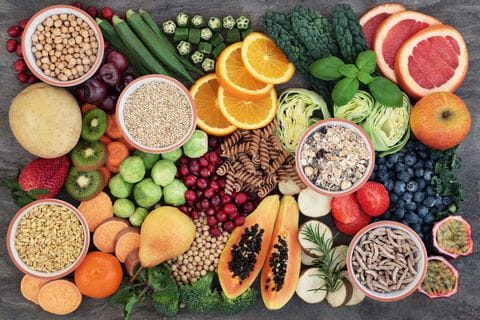The objective of this article is to acquaint readers with ways that they can eat in a healthy manner to possibly lower their overall cancer risk.
Summary: Many foods may help lower the risk of certain cancers. Cancers spring from a variety of sources. Some cancers are more amenable to certain foods that contain phytochemicals, most specifically, anti-oxidants.

These antioxidants are instrumental in protecting the body from some cancers. This article seeks to explain the process and suggest some foods that may protect the body from some cancers.
Some cancers are genetic in nature. They have not yet been eliminated. However, there are other risk factors that can be modified. The American Cancer Society estimates that one-third of cancer deaths each year are related to lifestyle factors such as smoking, amounts of physical activity or the lack of it, and what people eat.
Further, scientists have taken note that populations that are rich in plant foods have a lower risk of certain diseases including cancer.
In this article, we are talking about phytochemicals. These are naturally occurring chemicals in certain foods. Of these phytochemicals, those that have drawn a great deal of interest are the antioxidants. Here is how it works.
The body oxidizes food nutrients to obtain energy. In this process, byproducts called free radicals may be released. These can cause damage to cell structures unless they are neutralized which is the job done by the anti-oxidants. So, how then do we get antioxidants into our bodies?
Several vitamin such as E and C are excellent anti-oxidants as well as the minerals selenium. copper, zinc, and manganese. Overall, the best sources of antioxidants, sometimes called free-radical scavengers, are fruits, vegetables, nuts and whole grains.
The National Cancer Institute promotes eating at least five servings daily of a variety of fruits and vegetables. This goal is directed at hopefully reducing the risk of stomach, prostate, pancreatic, endometrial, and breast cancers.
In addition, a number of studies have demonstrated an associated risk reduction for lung, oral, esophageal, and colon cancers.
Fruits are a major source of phytochemicals called flavonoids. Flavonoids may help lower the risk of cancer and cardiovascular disease and may also reduce the effects of aging. Citrus fruits have phytochemicals that may offer some protection against pancreatic, breast, and prostate cancers. Tomatoes are a good source of lycopene. This is the chemical that makes tomatoes red. Lycopene may be associated with lowering the risk of prostate cancer.
Vegetables are also significant in their propensity to lower cancer risk. There are the cruciferous vegetables like arugula, bok choy, broccoli, cabbage, cauliflower, kale, radishes, watercress, and brussels sprouts. These vegetables help to keep the digestive track clean. They may assist in the prevention of colorectal cancer and others.
Garlic has also been noted in the field of cancer protection. Allyl sulfur and other compounds found in garlic appear to slow or prevent the growth of tumor cells.
Ginger may possess cancer-fighting properties as well.
Whole-grain foods such as whole-wheat breads, pastas, brown rice and oatmeal are foods rich in phytochemicals. Legumes such as beans, lentils, peas, soybeans, and black-eyed peas are a good substitute for meat if you are thinking about a plant-based diet.
Soy protein is unique. Some research has demonstrated that it may offer some protection from some hormone-dependent cancers. One of these is breast cancer that is influenced by estrogen and prostate cancer that is influenced by testosterone. However, the American Cancer Society has cautioned breast cancer survivors to eat only moderate amounts of soy supplements because they may increase the risk of estrogen-responsive cancers.
Fish make a good substitute for red meat. You want the fish that is fatty and of a cold-water nature such as salmon, sardines, and mackerel. fatty fish are rich in omega-3 acids. These may help reduce cancer risk. However, it is important here to may attention to national or local warnings regarding consumption levels of fish that may be affected by water contaminants such as mercury.
There is also evidence that adequate calcium intake, particularly from low-fat dairy foods may help lower the risk of colon cancer. However, the studies related to the pros and cons of eating calcium-rich foods is still in progress. Some studies show some link between high calcium intake and prostate Cancer and some don't.
For now, one may be safest by centering attention on a plant-rich diet, getting plenty of exercise, keeping alcohol consumption low (one drink every four days), and keeping your doctor informed as to your diet and levels of exercise. Some drugs like Warfarin are decreased in efficacy when combined with too much vitamin K. Vitamin K is found in green leafy vegetables. So, to protect against drug interaction with diet, discuss these issues with your regular family physician.
